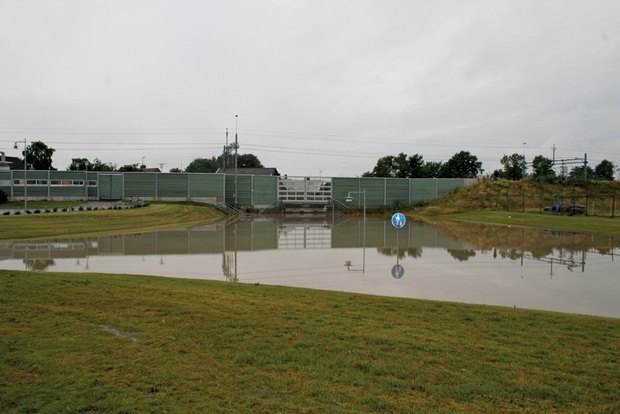
Flooding at Stångby in Lund municipality. Photo Cecilia Åkesson
The project, financed by the Swedish Environmental Protection Agency, offers personalised support by a climate coach to municipalities with less than 15 000 inhabitants. Twenty two municipalities from all over Sweden have thus far participated in the project. During the course of the project participants have gone through an often difficult but enlightening process in laying the groundwork for future more 'structured' climate work.
After 18 months half of the municipalities that have received help from a climate coach. 50% of the participates now have a climate strategy either fully adopted or referred for consideration. In addition, in all of those municipalities that have already received coaching the process of developing a climate strategy has begun.
In Sweden it is primarily the wealthiest municipalities which have the best understanding of their greenhouse gas emission levels and who have put in place an action plan to reduce them, namely, a climate strategy. It is necessary to cut emissions locally in order to reach the national target. Small municipalities with fewer resources however often lack goal-oriented climate change targets.
- We really only focus on our daily work, strategic work is something that we lack resources for, says Agneta Malm, head of planning in Osby. Through this project we have built a network of municipalities that work with the same questions. The help we got from the climate coach has also been invaluable and thus given us the confidence we needed to deal with these issues ourselves - climate work does not have to be difficult, Agneta continues.
- In my close contact with the municipalities I have seen that many make the same type of mistakes, for example how to organise internally or underestimate the time needed, says climate coach Andreas Lamppa. Knowledge of strategic climate work is often lacking in smaller municipalities. On the basis of the experiences of our work we believe that there will be a need for continued climate coaching for a long time to come, Andreas Lamppa predicts.
- The Swedish Network of Municipalities on Climate Change has developed a model for the local work that contains four cornerstones: inventory, goal, measures and follow up, says Håkan Samuelsson at the network's office.
The four cornerstones mean, in short, that each municipality has to make an inventory of their own greenhouse gas emissions. The inventory thus highlights those areas in which the emissions are greatest, namely, transport, industrial processes, heating and domestic electricity provision. The goals are then set showing how much emissions have to decrease. A list of measures shows what has to be done, by whom and when. Finally, regular follow ups are important to ensure that the measures actually fulfil the goals set out.
Håkan Samuelsson points out that the project has also provided other forms of knowledge: - One experience we gained from our close cooperation with the municipalities is that there is often little time to read national or regional documents. There is a lot of expertise in Sweden, but as a local officer you find it difficult to acquaint yourself with it. The aim of this project is to help construct a robust internal organisation around local climate work. When questions con-
cerning climate issues appear from the national or regional level there is then a receiver on the local level, Håkan concludes.
According to the Swedish Environmental Protection Agency, climate action in Swedish municipalities has led to a reduction equivalent to two thirds of Sweden's climate goal 2008-2012. Despite this, many municipalities still do not engage in strategic climate work. These municipalities can often be distinguished by a lack of political support for climate change work and in many cases also by the impeding of officers attempting to do such work in the organisation. The climate coach has often showed that by combining various skills from several municipal administrations all the necessary competence is often actually already available.
The climate coaching project initially focused on greenhouse gas emissions and how municipalities can work to mitigate global warming. The question of adaptation has only gradually arisen. This is particularly true in those munici-
palities that already suffered from floods and severe storms (especially Gudrun and Per).
The city of Lund, in southern Sweden, has for many years been working to change its citizens' habits in respect of transportation. Today 50 % of all short trips occur by bicycle. The people of Lund are biking some 170 000 km each day. Through extensive commitments to public transport, bicycle paths and other physical measures the city has thus succeeded in reversing the ongoing increase in motor traffic usage witnessed in the rest of Sweden. Indeed, for some years now the amount of motor traffic on Lund's roads has not increased.
- We have been working to get more renewable fuel into the district heating system. We are also trying to reach the inhabitants with concrete information about what everyone can do to mitigate climate change, says Karin Loodberg, Head of the department for environ-
mental strategies, in the City of Lund.
- However, we have not come very far with our work on adaptation. We have begun discussion and it is clear that our organisation retains a significant level of competence in this field. Nevertheless, there is, as yet, no action plan or list of measures for what we have to do, she continues.
An officer from Lund participated in a working group meeting arranged by Municipal Responses projekt and took part in formulating the guidelines developed by the project.
- We think that we can, internally, make a good start on adaptation. It resembles climate coaching, it is a help for us to get going, concludes Karin Loodberg.
By Camilla Alfredsson, Samordnare Klimatkommunerna, Miljöstrategiska enheten, Lunds kommun